Can Guinea Pigs Eat Asparagus? – The shortest answer is yes, but it should be in moderation!
Guinea pigs, those adorable and cuddly pets, require a well-balanced diet to thrive. As a conscientious owner, you might be curious about expanding their menu to include vegetables like asparagus. This article will discuss the possibilities and considerations when feeding asparagus to guinea pigs.
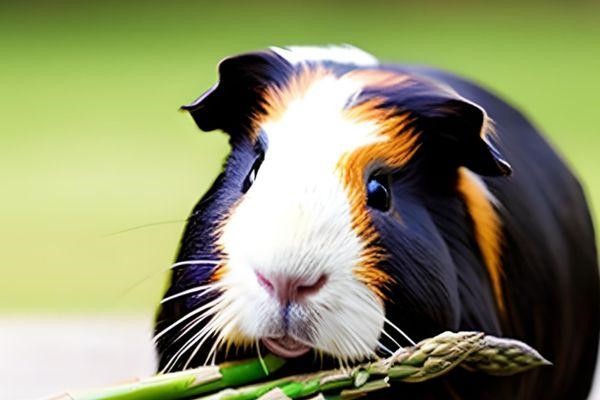
Contents
- 1 What Nutrients Does Asparagus Have?
- 2 What Negative Effects Can Asparagus Cause to Guinea Pigs?
- 3 How to Feed Your Guinea Pig Asparagus Properly?
- 4 Which Types of Vegetables Are Suitable for Guinea Pigs?
- 5 Which Types of Fruits Are Suitable for Guinea Pigs?
- 6 What Foods Should Guinea Pigs Avoid Eating?
- 7 FAQs
- 8 Final Thought
What Nutrients Does Asparagus Have?
Before delving into whether guinea pigs can eat asparagus, let’s examine the nutritional profile of this green veggie.
Vitamin A
Asparagus contains a lot of Vitamin A; every 100g of asparagus contains 756 IU of Vitamin A. In particular, Vitamin A is a great nutrient that helps develop skin and organ tissues, as well as improve vision.
The development of skin tissue is significant because when a guinea pig suffers skin damage, such as a wound caused by a fungal infection or an abrasion, its body needs to regenerate skin cells quickly. Quickly recover from skin wounds.
Vitamin C
Besides Vitamin A, asparagus also provides a lot of Vitamin C; for every 100g of asparagus, there will be 5.6 mg of Vitamin C.
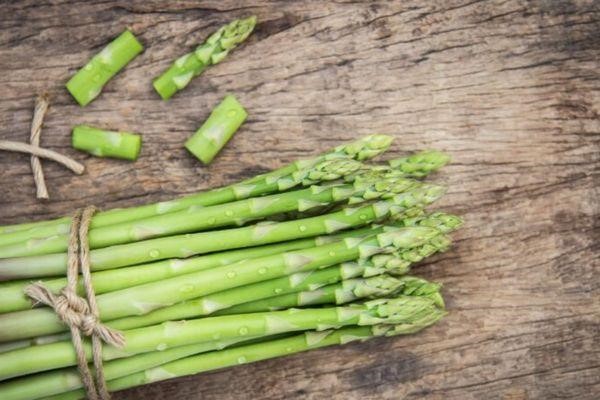
Vitamin C plays a crucial role in safeguarding guinea pigs against the development of scurvy. Scurvy can cause pain and discomfort to guinea pigs and cause loss of appetite, leading to other health problems due to malnutrition. In this condition, the guinea pig will bleed more than normal when it has injuries to its skin, and it takes longer for these wounds to heal.
You need to remember that asparagus is not a great source of Vitamin C, so you need to supplement other foods to get enough of this vitamin in its diet.
Vitamin K
Asparagus contains 41.6 µg per 100 g serving. Vitamin K will help blood clot and support your guinea pigs’ overall healing process. Their blood can clot in case of any possible injury, so consuming plenty of Vitamin K will ensure they can heal properly.
Other Nutrients
Not only is asparagus rich in vitamins, but it also has antioxidants! This substance helps protect cells from free radicals and oxidative stress, which have a high potential to lead to inflammation and premature aging in your guinea pigs.
Moreover, asparagus also contains folate, also known as Vitamin B9, which helps create red blood cells and helps break down carbohydrates into energy.
What Negative Effects Can Asparagus Cause to Guinea Pigs?
Eating asparagus will bring many benefits but also some negative effects for guinea pigs. If your adorable pet consumes too much of this vegetable, they may develop bladder stones due to the oxalic acid content. Therefore, you must feed your guinea pigs asparagus in moderation.
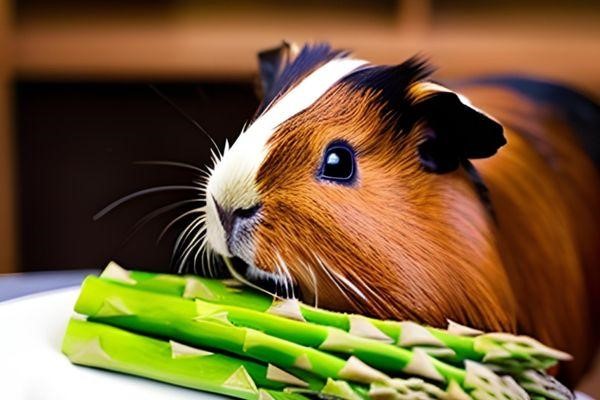
If you cannot buy organic asparagus, the presence of pesticides will be a serious problem that you must address. They can be a potential cause of health problems, even poisoning. Ensure you wash these vegetables carefully before feeding them to your guinea pigs to ensure their health.
In addition, when your pet consumes asparagus in too large quantities, it can cause some digestive problems such as bloating, constipation, and diarrhea. Therefore, you must observe how your guinea pigs react to all foods when feeding them. Their body will tell you whether something is good for them or not.
How to Feed Your Guinea Pig Asparagus Properly?
To avoid health problems that come from eating too much, you can give your guinea pig a few small slices about half an inch thick, once or twice a week.
As we mentioned before, asparagus can contain many pesticides, so you must wash it carefully and thoroughly before feeding it to your furry friend.
Which Types of Vegetables Are Suitable for Guinea Pigs?
In addition to asparagus, guinea pigs can enjoy a variety of vegetables that contribute to a well-balanced diet. Some suitable options include:
- Broccoli: This type contains vitamin C; however it also contains high amounts of vitamin A, so it should be fed to your pet occasionally.
- Cabbage: This is rich in vitamin C. However, don’t feed your guinea pig too much, as it can cause gas and bloating.
- Carrots: They are loved by Guinea Pigs. However, they contain sugar, which can lead to dental problems and diabetes. They also contain oxalate, which has the potential to contribute to the formation of oxalate stones. They also contain large amounts of vitamin A.
- Cauliflower: This can be fed to your guinea pigs occasionally. It has vitamin C, but it can also provide gas for your Guinea Pig.
- Corn on the cob: This type contains vitamin C, but it is high in starch so only feed it occasionally once or twice a week.
- Cucumbers: Guinea pigs can eat meat, seeds (not too much), and skin.
- Green beans: They have vitamin C and can be fed raw. Exercise caution, as they also contain calcium and phosphorus.
- Peas: Like most vegetables, they contain Phosphorus and Calcium. However, they also have vitamin C. You can feed your guinea pigs peas in moderation.
- Parsley: This can be a delicious snack for your Guinea Pig. It can be fed regularly, once or twice a week.
- Parsnip: It can be fed regularly and is a delicious vegetable for your Guinea Pig
- Raw beets: Can be fed to your Guinea Pig once or twice a week. It does not contain oxalates but does contain small amounts of calcium and phosphorus.
- Sprouts: They contain phosphorus and oxalate acid. They can also cause gas. They can be given as occasional treats, ideally once or twice a week.
- Spinach: Your guinea pig can eat this occasionally, but be aware that it can cause stones if mixed with calcium. This is due to its high oxalate content.
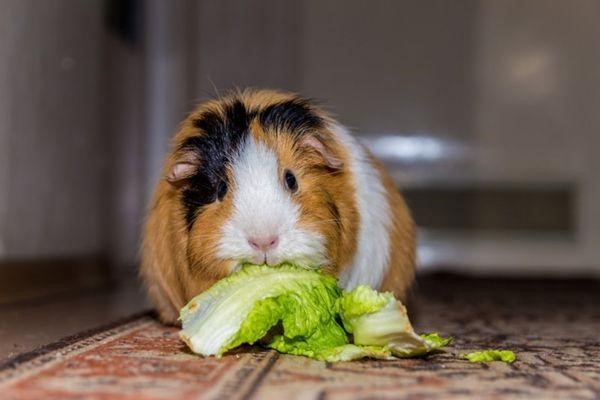
- Squash: Can be fed to your guinea pig in moderate amounts.
- Tomatoes: Can be fed regularly. However, the green stem is poisonous so do not feed it to your piglets.
- Turnip greens: They have a low phosphorus and high calcium ratio. They also contain a notable amount of vitamin C. You can feed them to your Guinea Pig once or twice a week.
- Watercress: They can be fed occasionally. It is good for your Guinea Pig and contains high amounts of vitamin C.
- Red cabbage: They contain large amounts of vitamin C and a little calcium. You can feed it regularly.
- Red peppers: They contain high amounts of vitamin C and can be fed regularly.
- Turnip greens: They contain vitamin C, they also contain calcium, and a little phosphorus. You can feed these to your guinea pigs occasionally, once or twice a week.
Which Types of Fruits Are Suitable for Guinea Pigs?
Fruits can be offered as occasional treats, and some safe choices for guinea pigs include:
- Bananas: These types of bananas are rarely fed because they are high in sugar and can cause constipation.
- Blueberries: They can be fed regularly, and they are a good source of vitamin C.
- Oranges: Feed them occasionally, as citrus can cause mouth pain.
- Pears: They should be fed occasionally, and they provide a good source of vitamin C.
- Pineapples: They should be given to children occasionally because it is acidic and can cause mouth sores.
- Prunes: They can be fed occasionally, but they are high in sugar.
- Strawberries: They can also be fed occasionally, even with the green tops.
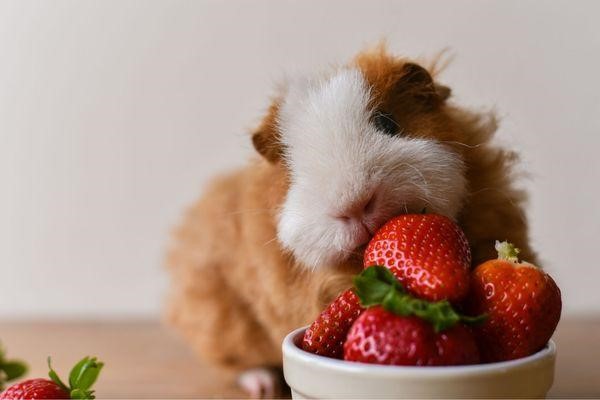
What Foods Should Guinea Pigs Avoid Eating?
Some foods can pose harm to guinea pigs and should be avoided:
- Grains: Avoid grains as many are not good for Guinea Pigs
- Meat: Guinea pigs are herbivores and cannot be processed for meat
- Cooked food: Guinea pigs cannot digest cooked food
- Potatoes: They contain toxins that can harm your Guinea Pig
- Underripe tomatoes: They contain toxins that can harm your Guinea Pig
- Tomato leaves and stems: They contain toxins that can harm your Guinea Pig
- Rhubarb: It contains toxins that can be harmful to your Guinea Pig
- Avocado: The skin is very toxic, but the flesh is not toxic. It contains a lot of fat. This can slow down digestion
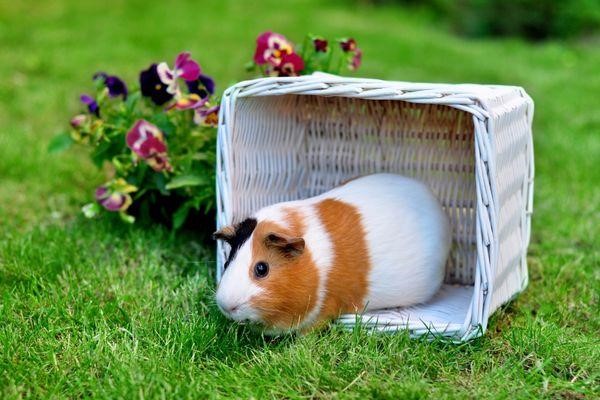
- Cores, pits, and seeds of the fruit: Many of these are inedible, so they are best avoided
- Buttercup: They contain acrid toxins that can cause intestinal irritation
- Dairy products such as milk, cheese, yogurt should not be fed to Guinea Pigs
- Garlic: There is ongoing debate about the safety of garlic for guinea pigs. It’s probably best to avoid it
- Juice: Guinea pigs should only consume water.
- Onions: This is part of the onion family and can cause gas and intestinal disorders
- Leeks: These belong to the onion family and should be avoided.
- Nuts: They can cause digestive problems
FAQs
Can Guinea Pigs Have Asparagus?
Yes, guinea pigs can eat asparagus in a suitable amount. It’s important to introduce it gradually and monitor for any adverse reactions.
Can Guinea Pigs Eat Squash?
Yes, guinea pigs can certain types of squash, such as zucchini and butternut squash. Ensure it’s fresh, washed, and cut into small, manageable pieces.
Can Guinea Pigs Eat Peas?
Yes, guinea pigs can eat peas. However, peas should be provided in moderation as they contain natural sugars.
Can Guinea Pigs Eat Celery?
Yes, guinea pigs can enjoy celery. Ensure it’s fresh, washed, and cut into small pieces to prevent choking.
Can Guinea Pigs Eat Red Cabbage?
Yes, guinea pigs can eat red cabbage, but it should be offered in moderation due to its high calcium content.
Can Guinea Pigs Eat Cucumbers?
Yes, guinea pigs can have cucumbers. Cucumbers are hydrating and have low calories, making them a suitable and healthy snack for guinea pigs.
Can Guinea Pigs Eat Grapes?
Yes, guinea pigs can eat grapes. However, grapes should be provided in moderation due to their high sugar content. It’s advisable to remove seeds to prevent the risk of choking.
Final Thought
Asparagus can be a nutritious addition to a guinea pig’s diet when fed in moderation and with attention to their individual reactions. Always prioritize a well-balanced diet that includes a variety of vegetables and fruits to ensure they receive essential nutrients.
Paying close attention to their behavior and consulting with a veterinarian can help tailor their diet to meet their specific needs, promoting a happy and healthy life for your beloved guinea pig.
